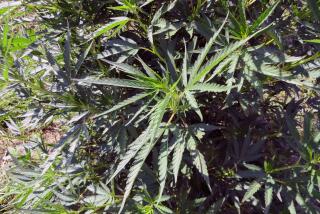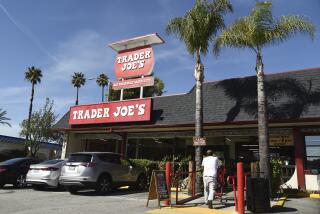Deja vu for Dole as CEO makes bid to take company private again
Billionaire David H. Murdock has made an unsolicited buyout offer for the 60% chunk of Dole Food Co. that he doesn’t already own, valuing the Westlake Village company at nearly $1.1 billion.
The bid of $12 a share marks the latest step in Dole’s dance in and out of public ownership and represents an 18% premium over the stock’s closing price Monday of $10.20. Shares of the world’s largest fresh fruit and vegetable producer finished Tuesday up 22%, or $2.26, at $12.46.
Murdock, who is Dole’s chairman, chief executive and largest shareholder, presented his proposal to the board Monday night in proceedings probably marked by deja vu.
When Murdock last took over Dole in 2003, he held 24% of the company’s outstanding shares. He shelled out $33.50 a share, or $1.4 billion, for the remainder, while also assuming about $1 billion in debt. In 2009, he took the company public in its second initial public offering.
Since then, he’s watched Dole take a downturn.
Extreme weather, including a cycle of scorching heat and severe cold that attacked Dole strawberry farms in California, has made the fresh fruit and vegetable industry especially volatile. The company said it expects lower earnings this year from its banana and berry operations.
Last year, it reported revenue from continuing operations of $4.2 billion, down 11% from the prior year.
In April, Dole shrank to a smaller footprint after wrapping up the sale of its global packaged foods and Asia fresh foods businesses to Japanese firm Itochu Corp. for nearly $1.7 billion. The divisions represented a third of Dole’s revenue and more than half of its operating income.
Murdock, who had served as chief executive from July 1985 through June 2007, was reinstated at that point after David A. DeLorenzo stepped down from the post to help Itochu run its new businesses.
Last month, Dole suddenly suspended a $200-million share repurchase program it had announced a few weeks earlier, saying it needed to redirect its resources to expanding its fleet of container ships. Dole also said “significant losses” in its strawberry business dragged down earnings.
The announcement caused a 16% stock slide within a week.
As the company struggled, its chief executive was building up his liquidity position. Last year, Murdock sold most of the Hawaiian island of Lanai to Oracle Corp. CEO and fellow billionaire Larry Ellison for a reported $500 million.
So although Murdock’s proposed coup took many on Wall Street by surprise, “it probably should not have,” wrote Barclays analyst Hale Holden in a note to investors.
Some said they smelled something rotten in Murdock’s timing.
New York law firm Wohl & Fruchter, which holds no stake in Dole, said it is inviting shareholders to join its nascent investigation of the buyout bid.
Scheduling the proposal so soon after calling off the share repurchase program “seems like an attempt to exploit the weakness in the stock price,” said J. Elazar Fruchter, a partner at the firm.
Murdock’s $12-a-share offer is less than September’s 52-week high of $15.19 a share as well as the $12.50 a share at which Dole last went public, Fruchter said. He said Tuesday’s closing price above $12 suggested that investors may want a better offer.
“We’ve seen this in the past, when a shareholder wants to purchase a company and makes an effort in advance to draw the stock price down to make his or her offer appear favorable in comparison,” he said. “It’s not illegal, but it is a question of whether they’re acting in shareholders’ interests.”
But Wall Street analysts seemed satisfied.
Given Murdock’s past successes with the company, Holden of Barclays wrote that the proposal has “a relatively high probability of completion.” Analysts at Janney, in a note to investors, called Murdock’s bid “an attractive transaction that is likely to proceed at or relatively close to this price level” despite “tougher than average near-term trends in bananas.”
Murdock said he would also assume the company’s debt in the transaction. Deutsche Bank, serving as an advisor to Murdock, wrote in a letter that it is “highly confident” in Murdock’s abilities to finance the deal, he said. He hopes to solidify a deal by the end of July.
The Dole board said in a statement Tuesday that it would meet in the next few days to review its options.
The oldest CEO in the Fortune 500, Murdock is the grayest member of a crop of executives trying recently to take the ownership reins of their companies.
Michael Dell, founder and chief executive of technology company Dell Inc., has support from the board for his quest to buy out the business. Shareholders are expected to vote on the proposal July 18.
In February, Barnes & Noble Inc. Chairman Leonard Riggio indicated in a regulatory filing that he plans an attempt to take over the retail side of the bookstore business he bought four decades ago. He is currently the company’s largest shareholder.
Richard Schulze, Best Buy’s founder and top shareholder, returned to the company in March as chairman emeritus, but not before spearheading a plan to acquire the electronics retailer. The plan subsequently was dropped.
None of the companies or executives, however, have been around quite as long as Murdock and Dole.
The produce behemoth began in 1851 as a trading company in Hawaii but takes its name from James Dole, a Harvard graduate with a yen for pineapples who arrived in the state in 1899.
And although not 162 years old, Murdock, 90, is closer than most.
The high school dropout is the son of a traveling salesman. He’s also chairman, chief executive and president of Castle & Cooke Inc., a Los Angeles real estate and development company.
Additionally, Murdock is a health nut who in 2006 opened a 20-acre resort and health institute in Westlake Village. He attributes his longevity to his disciplined diet of fish, nuts and produce.







